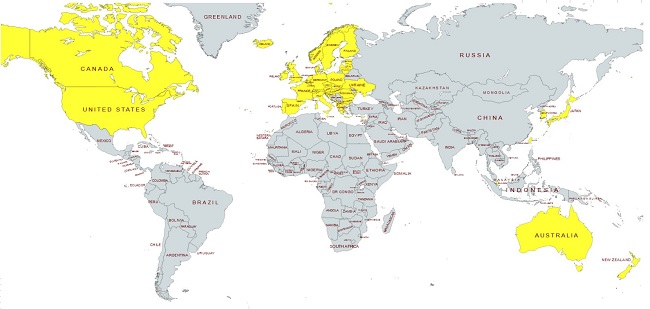The Australian Alert Service is the weekly publication of the Australian Citizens Party.
It will keep you updated on strategic events both in Australia, and worldwide, as well as the organising activities of the Citizens Party.
To subscribe to the Australian Alert Service, it's easy, and it's secure.
Lead Editorial
16 March 2022
Vol. 24 No. 11
There are two diametrically opposed ways of viewing the world which have strikingly different outcomes; we are experiencing the ugly impact of one of them right now.
Working together despite our differences and overcoming disagreements through diplomacy; or, enhancing those differences by establishing blocs and alliances whereby those same disagreements bring the world to the brink of war. The Citizens Party warned of the consequences of ignoring Russia’s security concerns provoked by the eastward advance of NATO and the foreign takeover of its neighbour Ukraine. The dominant trans-Atlantic power bloc, however, continued to view international relations through the prism of geopolitics, inspired by centuries of British imperialist methods. At various points in history, a different future would have awaited us if we had taken the alternative path: When the Berlin Wall fell, the world could have taken up the opportunity on the table for cooperative economic development starting with the Eurasian Land Bridge (a precursor to the Belt and Road Initiative). Or at many other potential turning points, such as the transition between fighting the “War on Terror” (justifying regime change) and the pivot to “major power conflict” which targeted Russia and China as adversaries of the West, hinging on situations ripe for exploitation in Ukraine and Taiwan.
International law harks back to post-World War II agreements (in the UN Charter) which themselves represented a new phase of the 1648 Treaties of Westphalia, which ended the Thirty Years War by all parties agreeing not to seek retribution for injustices of the past. Extraordinarily, this was based on the principle of The Advantage of the Other—putting the interests of your neighbour ahead of your own—but all sides signed knowing their enemy was signing on the same basis. As reflected in the later UN Charter, the Treaties also enshrined the principle of non-interference as the foundation of national sovereignty.
What benefits us, benefits our neighbours. Ultimately, the interests of all human beings are alike. It is just a matter of rising to a level at which you can find that commonality—if you don’t try you won’t find it, and you instantly set yourself on the path to conflict.
China and Russia have long insisted upon respecting international law, as opposed to the “rules” fashioned discriminately over recent decades by Anglo-American neoconservatives and neoliberals clinging to unipolar hegemony. There is no doubt that other major nations such as India, and many, many other smaller nations, would prefer this approach, which allows them to collaborate with their neighbours. The consequences of adopting a geopolitical world view are hitting hard. Financial and economic sanctions on Russia are impacting the global financial system everywhere, and the hit that will be taken by the real economy, already in breakdown mode, by this Economic Iron Curtain, will be serious.
Russia has taken significant steps to adopt a wartime economy, including measures to prevent capital flight; to prevent shutdown of departing foreign-owned companies, especially manufacturers; to ramp up domestic production to replace imports; a six-month moratorium on debt service in the agricultural sector; and measures to back up bank liquidity.
Even at this late hour, there are still efforts to shift the world to an alternate pathway. In a 28 February video message marking the 50th anniversary of the Shanghai Communiqué, which normalised relations between the USA and China, Chinese Foreign Minister Wang Yi again invited the USA to participate in the Belt and Road Initiative, cooperating via the US Build Back Better World (B3W) initiative proposed in mid-2021 as a BRI rival. As Silk Road Briefing reported, “The Shanghai Communiqué, a document which marked the end of isolation between both countries and issued during then-US President Richard Nixon’s historic visit to China, meant that two major powers with different social systems were willing to coexist peacefully.”
This is the approach Australia must support—for our benefit, and everyone’s.
In this issue:
- Harness the Reserve Bank to fund reconstruction—now!
- Australia’s ‘laughable’ flood prevention is a recurring tragedy
- Fuel price crisis a bipartisan policy failure
- AAP Fact Check fails on basic ‘bail-in’ facts
- Public and postal banking agenda advances in USA
- Fed still lying about end to quantitative easing
- NATO in Ukraine: What Moscow saw
- DOCUMENTATION: Putin on NATO
- How could we change America’s course?
- ‘We’ve got to vote these bastards out!’
- Petition: Repeal the ban on clean, safe, reliable nuclear power generation
- Small-mindedness will not rebuild Australia
- ALMANAC - Ukraine crisis: failure of the post-Cold War order - Part 1
Click here for the archive of previous issues of the Australian Alert Service








